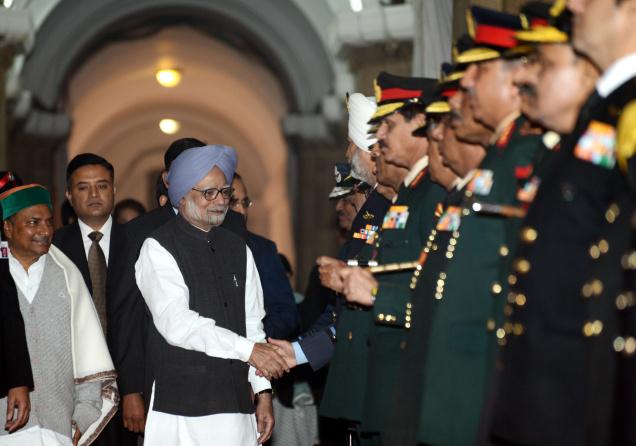NEW DELHI, November 23: With India sitting in the midst of an area of intense global contest to its east and one of conflict to its west, Prime Minister Manmohan Singh while addressing the Combined Commanders’ Conference at the South Block here on Friday called upon the Armed Forces to pay close attention to these specific developments. Dr. Singh also spoke about the need to build a strong domestic defence industrial base, using the international environment as also the full potential of India’s own public and private sector capabilities.
Spelling out the various challenges faced by the country in the present global scenario, Dr. Singh said as for the situation in India’s neighbourhood, “there is no doubt that we will continue to confront formidable challenges.”
Even further afield, he noted that the continuing turmoil in West Asia could not only imperil India’s energy security and the livelihood and safety of seven million Indians, but also become a crucible for radicalism, terrorism, arms proliferation and sectarian conflict that could touch the country’s shores too.
He also pointed to the developments in South East Asia with great concern. “If you survey the global strategic environment over the past decade, it would not escape your notice that, just as the economic pendulum is shifting inexorably from west to east, so is the strategic focus, as exemplified by the increasing contestation in the seas to our east and the related ‘pivot’ or ‘rebalancing’ by the U.S. in this area.”
The Asia Pacific region, with which India’s relations are intensifying in every domain, he said, was equally critical for India as it was becoming the arena for shaping the behaviour of major powers.
Seeing in this a “development fraught with uncertainty”, Dr. Singh said it was not immediately known if “these economic and strategic transitions will be peaceful, but that is the challenge this audience must grapple with institutionally.”
Referring to the challenges posed by the rapid pace of globalisation in the post Cold War era, he said: “What is new today is the pace and texture of globalisation driven by technology, including the ubiquitous Internet. While globalisation has induced growing and complex inter-dependencies among states and multinationals on the economic and trade front, it has also nurtured intense competition and rivalries in the security domain.”
Dr. Singh praised the Indian military for having risen to the occasion every time. People acknowledge the Indian military for its patriotism and professionalism, he said. The way ahead lay in the path of peace but one where the military must be able to protect Indian interests if they are threatened or challenged.
On what the Armed Forces should do to meet the challenges, he said, “Our strategic horizons should also include the need to protect our global seaborne trade in goods, energy and minerals, the well-being of Indian expatriate communities worldwide and the growing global footprint of Indian capital. As our capabilities grow, we will increasingly be called upon to help in natural disasters or zones of conflict and instability.”
He also urged the Defence Ministry, the armed forces, and the Defence Research and Development Organisation, to build on their experience and urgently review the different Task Force reports that the Centre had initiated to achieve a higher index of indigenous capability in military inventory production.
He appealed to think in terms of aggregate national capacity that harnesses the full power of the country’s public sector, private enterprises, research laboratories and universities to create an efficient indigenous base for production, research and development. “We must also take advantage of a favourable international environment to build a domestic defence industrial base.”
The economist in Dr. Singh also came to fore when he spoke about how India needs to match its investment in military equipment and forces to its national resources. “… The last two years have seen slow growth and we continue to face an uncertain international economic climate marked by volatile exchange rate fluctuations and the possibility of fragmenting trade regimes… we will have to exercise prudence in our defence acquisition plans and cut our coat according to our cloth,” he said.
Dr. Singh also remembered the sailors who perished in the submarine accident in Mumbai and the soldiers who died defending the borders, combating terrorism, conducting rescue missions in Uttarakhand and even those “whose stories did not become public.”

